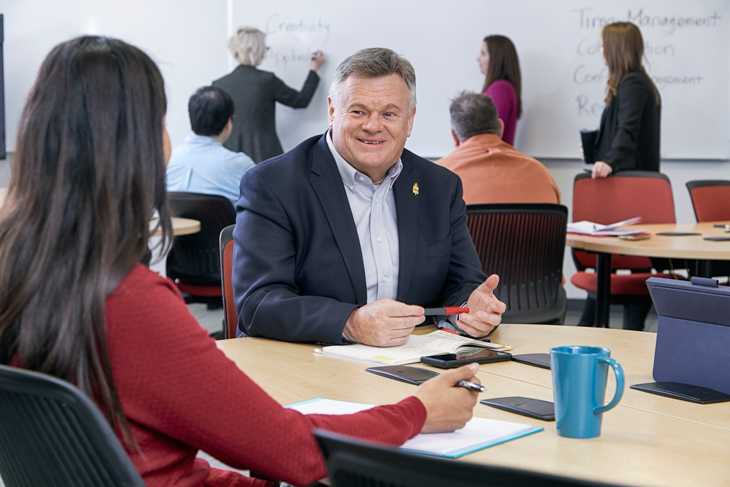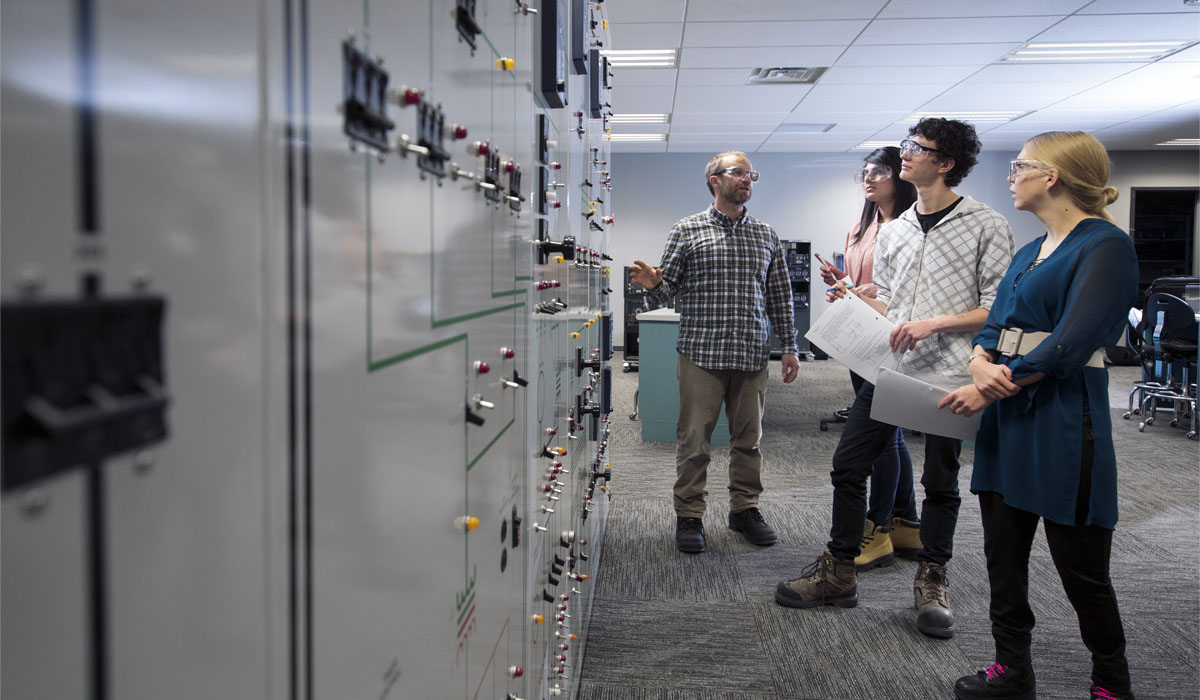Overview
Looking to move up in your power engineering career? If you hold a Second Class Certificate of Competency and want to step into higher-responsibility roles in power plants, industrial facilities, and energy management, this program will get you there.
The First Class Power Engineering Certificate of Achievement program provides the advanced technical knowledge you need to prepare for the eight Alberta Boilers Safety Association (ABSA) exams required for First Class certification: A1 to A4 and B1 to B4. Completing all eight theory courses may also earn you up to 12 months of credit toward ABSA’s 36-month operating experience requirement.
This program lets you study while balancing your work and life commitments. As you progress through the eight comprehensive, industry-aligned courses, you'll gain expert knowledge to handle high-pressure boilers, power plant operations, and complex energy systems. You’ll also explore thermodynamics, fluid mechanics, safety regulations, maintenance management, leadership, and project management.
This program is ideal if you:
- need ABSA-recognized First Class Power Engineering theory to write certification exams and get work experience credit toward certification
- are a professional in power plant operations, industrial maintenance, and energy management not looking to be certified but wanting to expand your technical knowledge.
To be successful in this program, it is recommended you have:
- a minimum 50% in High School Grade 12 Math, English, Physics
- if you haven’t taken these courses or would like to refresh/upgrade your knowledge, consider taking a Academic Upgrading course equivalent.
You can enroll in this First Class theory program with or without having a valid Second Class Power Engineering Certificate of Competency. However, to eventually write the First Class Power Engineering certification exams with ABSA (or your province/territory's regulatory authority) you must have documented proof of a valid Second Class Power Engineering Certificate of Competency.
It is strongly recommend that you have completed six Second Class technical theory courses (PWEN 116, PWEN 117, PWEN 126, PWEN 127, PWEN 136, PWEN 137) or another ABSA-recognized educational institute before taking this First Class technical theory program.
If you’re pursuing the certificate, complete all eight courses in any order.
Upon successful completion of this certificate, you'll be able to:
- analyze thermodynamic principles, energy cycles, and heat transfer to optimize power engineering systems
- apply fluid mechanics and mechanical principles to evaluate forces, motion, stress, and strain in engineering systems
- evaluate metallurgical properties, material stress, and corrosion processes to implement effective prevention and monitoring strategies
- design fuel management systems by assessing fuel types, combustion optimization methods, burner designs, and emission control technologies
- implement water treatment processes, including pre-treatment, internal treatment, and non-boiler water treatment, to ensure system efficiency and compliance
- calculate electrical energy usage, plant efficiencies, and economic factors to enhance power plant performance
- interpret and apply boiler codes, ASME standards, CSA regulations, and industry piping and API codes to ensure compliance and safety
- develop and enforce workplace safety programs by integrating safety legislation, loss control strategies, and emergency response planning
- assess environmental legislation and implement environmental management systems to support sustainable industrial operations
- manage projects and maintenance programs using industry best practices, non-destructive examination methods, and reliability strategies
- monitor and optimize rotating equipment performance by analyzing turbine vibration, lubrication, and expansion data
- formulate business and contract management strategies, including budgeting and return on investment analysis, to improve operational decision-making
- lead teams effectively by applying leadership principles, communication techniques, and conflict resolution strategies
- design and implement recruitment, employee development, and organizational structures to support workforce growth and operational success.
Program outline
To successfully complete this certificate program, you are required to complete a total of eight mandatory courses. All supporting course materials and resources are accessible online in the Brightspace (D2L) learning platform.
Required courses & electives
How to apply for this certificate
Once you have registered for any course offered in this certificate, you will be automatically eligible to complete the certificate. You will have up to three years to complete this program. You may track your progression by signing in to your Continuing Education student account.
Certifications and professional designations
Upon successful completion of all required courses in this program, you’ll receive an electronically issued official SAIT Certificate of Achievement and transcript.
SAIT will also provide an official result letter for each of the eight courses completed, which you can submit with your application to write the ABSA First Class exams A1, A2, A3, A4, B1, B2, B3, and B4.
To receive the ABSA First Class Certificate of Competency (license to work as a First Class Power Engineer), you must provide proof of operating work experience. The required experience can be met in different ways, depending on your role/responsibilities and the facility where you work. ABSA may grant 12 months of experience credit toward this requirement upon successful completion of all eight courses in our First Class Power Engineering Certificate of Achievement. For details on how this applies to your specific situation, contact ABSA directly.
Power Engineering certification requirements and transfer provisions vary by province and territory across Canada. Check with the regulatory authority in your desired work location for details:
- want to work in Alberta? Contact ABSA.
- want to work in another Canadian jurisdiction? Reach out to the local boiler branch in your new jurisdiction.
Costs
This program consists of eight courses with varying fees. Fees include access to all course-related materials and resources found in Brightspace (D2L).
Please review the individual course pages for this certificate program to determine costs and to learn more about additional learning materials including textbooks.
Financial support
Financial opportunities are available to help pay for your course fees. Learn more about how to reduce your education or training costs with available awards, bursaries, loans and grants, including the Canada Alberta Productivity Grant.
Careers and opportunities
Skills learned in this program can be applied to a variety of careers. Expect to start at the entry-level, and as you gain experience and with additional education, your career opportunities will expand.
Stories and news

Alberta companies look to workforce training to close critical skills gaps
The Southern Alberta Institute of Technology (SAIT) provides corporate training to help businesses boost productivity and workplace performance.

Donor created space enables cybersecurity training for students and industry
The new SAIT Cyber Range creates an immersive cybersecurity training facility for students and industry in downtown Calgary.

Oki, Âba wathtech, Danit'ada, Tawnshi, Hello.
SAIT is located on the traditional territories of the Niitsitapi (Blackfoot) and the people of Treaty 7 which includes the Siksika, the Piikani, the Kainai, the Tsuut’ina and the Îyârhe Nakoda of Bearspaw, Chiniki and Goodstoney.
We are situated in an area the Blackfoot tribes traditionally called Moh’kinsstis, where the Bow River meets the Elbow River. We now call it the city of Calgary, which is also home to the Métis Nation of Alberta.




